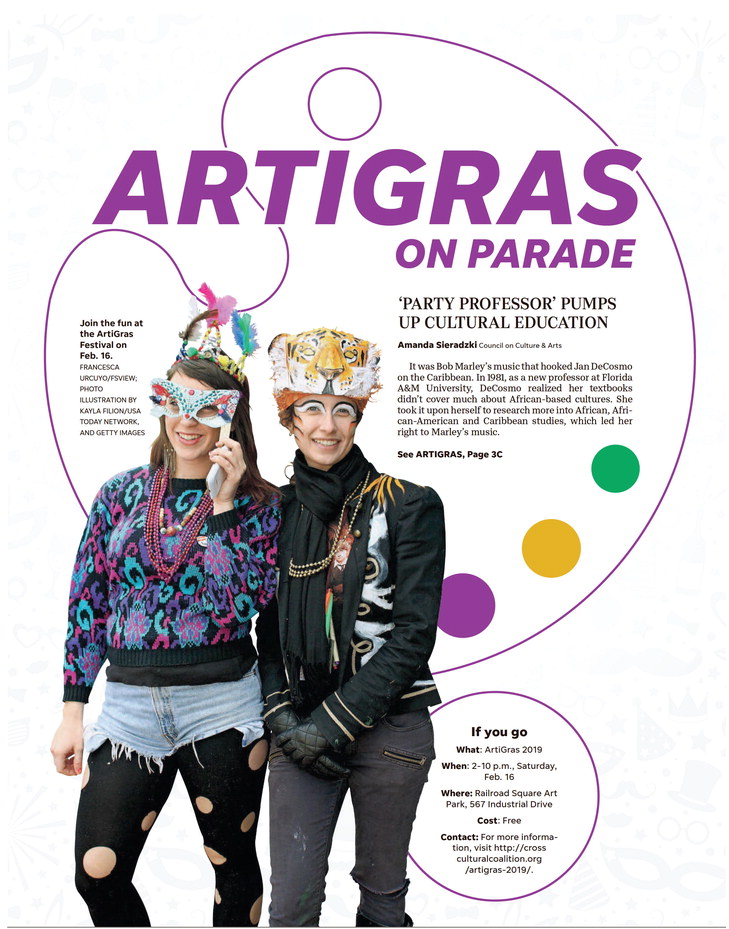 It was Bob Marley’s music that hooked Jan DeCosmo on the Caribbean. In 1981, as a new professor at Florida A&M University, DeCosmo realized her textbooks didn’t cover much about African-based cultures. She took it upon herself to research more into African, African American and Caribbean studies, which led her right to Marley’s music.
It was Bob Marley’s music that hooked Jan DeCosmo on the Caribbean. In 1981, as a new professor at Florida A&M University, DeCosmo realized her textbooks didn’t cover much about African-based cultures. She took it upon herself to research more into African, African American and Caribbean studies, which led her right to Marley’s music.
DeCosmo found his lyrics loaded with historical context — asking people to free themselves from mis-education and seek redemption to uplift their communities. DeCosmo had her students analyze his words. She also wrote a conference paper that she presented in Kingston, Jamaica, to celebrate Marley.
“I had to figure out how this tiny island in the Caribbean produced this musical prophet,” says DeCosmo, who was inspired to join a volunteer group that travels to the islands. “I went with them to Haiti and fell in love with Haitian painting and culture.”
From there, DeCosmo traveled to Jamaica with the Caribbean Studies Association. She was engrossed with the food, people, dance, literature and film. Now retired from FAMU, she is still an active member of the Cross-Cultural Coalition, which hosts an annual ArtiGras.
The parade will celebrate Mardi Gras and Creole culture on Saturday, Feb. 16.
DeCosmo is a fan of hands-on learning and “edu-tainment” as a way of sharing cultures. The goal of the Cross-Cultural Coalition is to promote understanding and combat stereotypes associated with African and Caribbean cultures. By providing activities like ArtiGras, DeCosmo believes stronger community relationships can form.
“People are afraid of what they don’t know,” says DeCosmo. “Instead of trying to teach dry history and facts, you lead people into history and culture through their art.”
The self-professed “party professor” hosted students in the Caribbean, Brazil, and other countries with strong African roots. There they immersed themselves in the culture, not even realizing the valuable knowledge they gained while having fun at festivals and other events.
Beyond her university career, DeCosmo continues to write grants and help to run the Cross-Cultural Coalition as a way to engage with the Tallahassee community. She sponsors and seeks funding for local groups’ performances and finds entry points for adults and youth to get involved with the culture.
“We try to have cultures meet each other and see what the common interests and influences are,” says DeCosmo. “We want to get information out about the arts and humanities related to those cultures and involve the community between FSU and FAMU.”
The coalition has a home in Railroad Square at Jan’s Gallery, an art and performance space which DeCosmo has filled with collections from her travels. She is fascinated by Haitian and Cuban artwork, and found much of her Brazilian artwork at a UNESCO World Heritage site where artists, musicians and the community coalesce.
DeCosmo has visited the site and delighted in seeing all age groups coming together to draw, dance, sing and perform. She recalls one drumming group in particular that encapsulated the importance of music in the culture.
“Girls were beating their moms’ frying pans all in matching costumes,” says DeCosmo. “The cultural workers take kids and teach them music and dance and then they perform in Carnival.”
Part of the excitement of large festivals like Carnival is the audience participation. DeCosmo is always ready to jump into parades and grab a shekere, a traditional percussion instrument, right alongside the band and music.
Read the rest of the story by visiting the Tallahassee Democrat
or read more by downloading the article here